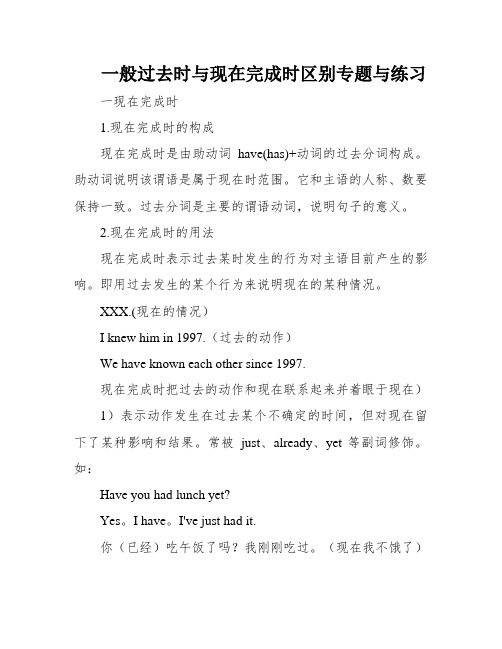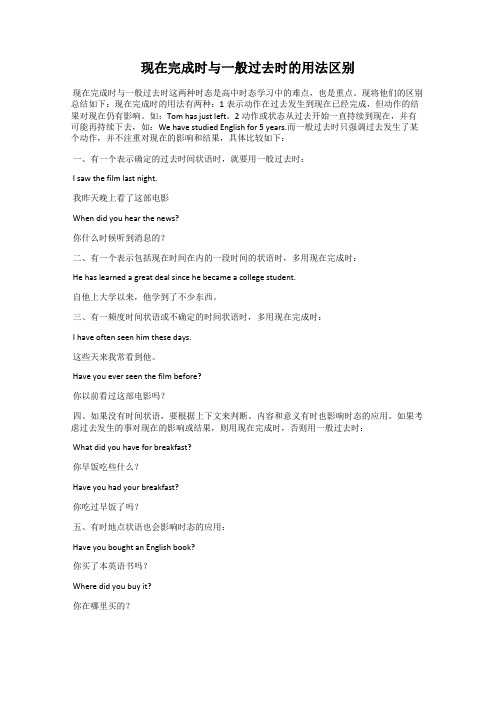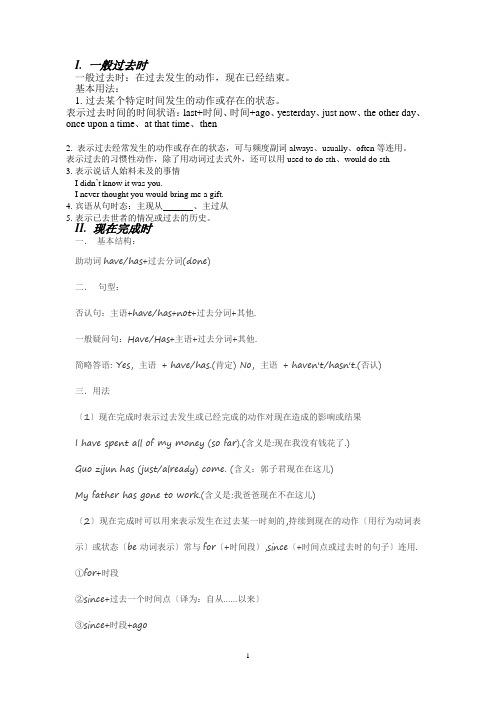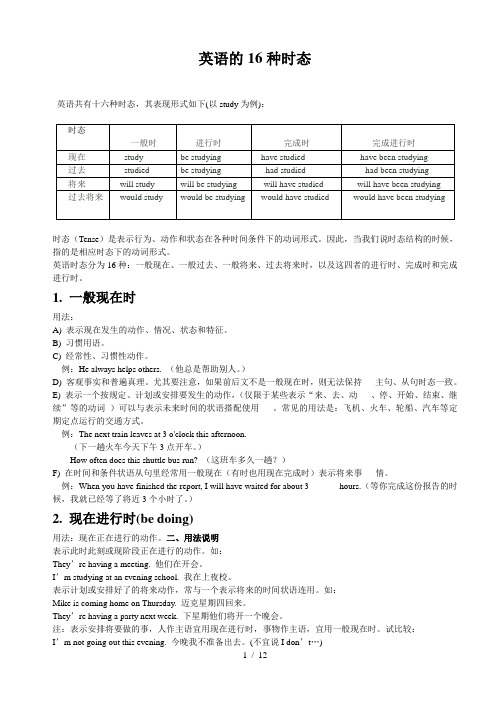一般过去时态和现在完成时态的区别练习题
一般过去时与现在完成时区别专题与练习

一般过去时与现在完成时区别专题与练习一现在完成时1.现在完成时的构成现在完成时是由助动词have(has)+动词的过去分词构成。
助动词说明该谓语是属于现在时范围。
它和主语的人称、数要保持一致。
过去分词是主要的谓语动词,说明句子的意义。
2.现在完成时的用法现在完成时表示过去某时发生的行为对主语目前产生的影响。
即用过去发生的某个行为来说明现在的某种情况。
XXX.(现在的情况)I knew him in 1997.(过去的动作)We have known each other since 1997.现在完成时把过去的动作和现在联系起来并着眼于现在)1)表示动作发生在过去某个不确定的时间,但对现在留下了某种影响和结果。
常被just、already、yet等副词修饰。
如:Have you had lunch yet?Yes。
I have。
I've just had it.你(已经)吃午饭了吗?我刚刚吃过。
(现在我不饿了)2)透露表现从曩昔某一时辰入手下手一向连续到目前的举措或状况。
这个举措大概刚截止,大概仍旧在举行。
常带有for和since等透露表现一段工夫的状语。
如:He has taught here since 1981他自1981年就在这儿教书。
(大概还要连续教)I XXX her for four years.我有四年没见到她了。
3)表示说话前发生过一次或多次的动作,现在成为一种经验,一般译为汉语“过”,ice。
ever。
never。
three times等时间状语。
如:I have been to Beijing twice.我去过北京二次。
3.现在完成时的时间状语1)目前完成时属于目前时范围,故不克不及和曩昔的工夫状语连用。
如:yesterday,lastSunday,in1990,three years ago 等。
可是,在夸大举措产生的结果和影响时,能够和一些透露表现不肯定的工夫状语连用。
一般过去时--现在完成时--区别及练习题

现在完成时与一般过去的区别1.两个时态的侧重点不同现在完成时强调的是过去的动作对现在的影响,它和现在有密切的联系。
一般过去时强调的是动作发生的时间、地点,不涉及对现在的影响。
She has seen the film before. 她看过这部电影。
(强调她已经看过了)She saw the film last night. 她昨晚看了这部电影。
(强调时间是昨晚)Mr Green has bought a new computer. 格林先生买了一台新电脑。
(强调格林先生现在有了一台新电脑)Mr Green bought a new computer yesterday. 格林先生昨天买了一台新电脑。
(强调买新电脑的时间是昨天)。
2.两个时态的时间状语不同。
现在完成时常与already,yet,just,ever,never,before等副词以及“for+一段时间”,“since+过去时间/从句”等时间状语连用。
不能单独与表示过去的时间状语连用。
一般过去时则常与“一段时间+ago”,just now,yesterday,last week等表示过去时间的状语连用。
Mike has lived in Beijing for 5 years. 麦克在北京住了五年了。
(强调已经住了五年)Mike lived in Beijing 5 years ago. 五年前麦克住在北京。
(强调时间点是五年前)Lucy has just called you. 露西刚打过电话给你。
(强调已经打过电话了)Lucy called you just now. 露西刚才给你打了电话。
(强调打电话的时间是刚刚)注意点:(现在完成时的常用句型1.It is the first / sec ond time…. that…结构中的从句部分用现在完成时.It was the second time that the girl had been late. 这是女孩第二次迟到了。
英语时态中的一般过去时以及现在完成时讲解与练习(精品),适用于初中水平较好以及高中水平较差的同学

英语时态讲解与练习(二)一、一般过去时一般过去时是由动词的过去式来表示的。
一般过去时表示过去某一具体时间发生的动作或存在的状态。
动词的过去式的构成分为规则与不规则两类。
一般过去时的基本构成:规则动词后+ed1.表示过去发生的动作,与现在毫无联系,与确定的时间状语词连用,如:then,at thattime,just now,yesterday,last year,in 1998,……ago2.表示过去习惯动作,只适用于动态动词Eg.When she was in Beijing,she often came to see me.二、现在完成时(重点及难点)构成:助动词have/has+过去分词①表示过去发生的动作,对现在造成的结果或影响。
常与already, just, yet, in the last few years, so far,--Have you had your lunch yet?--yes, I have. I have just had it.(现在我不饿了)I have already posted the photos.(这些照片已不在这里了)②表示动作或状态从过去某个时间开始,一直延续到现在,可能刚刚结束,也可能继续下去。
常与for, since引导的时间状语连用(For+一段时间,Since+某一点时间),可以用how long提问。
其中“for+一段时间”用在肯定句中,动词必须是延续性动词;在否定句中,延续性动词或短暂性动词均可。
Since连接的从句中,常用短暂性动词的一般过去时。
I have known Li Ming for three years.They have lived here since 1996.They have lived here since they graduated from university.She has taught us since I came to this school.How long have you worked in this factory?现在完成时和一般过去时的区别现在完成时表示过去发生的某一动作对现在造成的影响或结果,强调的是现在的情况,所以它不能和表示过去的时间状语连用。
现在完成时练习及讲解

现在完成时态练习题一选择填空。
( ) 2. Her father ______in1990 and her husband ______for more than five years.(A) died ,dead (B) has died, dead(C) died ,has been dead (D) has died, has died( ) 3. I have _____this nice watch for two years.(A) had (B) bought (C) borrowed (D) lend( ) 4.He _____his home for ten years.(A)has left (B)left from(C)has been away from (D)was away from( ) 5.He _____a league member for three years(A)is (B)has been (C)has become (D)have become ( ) 6.Lihua's brother has _______for two years(A)joined the army (C)become a soldier(B)been an army (D)been in the army( ) 7.He hasn't _____Quanzhou ever since he left school (A) left (B)been away (C)been (D)away二选择填空( ) 1. ——Have you finished your homework ——Yes, I_______it last night(A) finish (B)finished (C)have finished (D)will finish ( ) 2.—— ________you ever _______to Nanjing ——Yes, I ______there last year. (A)Have…gone, have gone (B)Did…go, went (C)Have…been , went (D)Did…go, has , been )( ) 3.——When _______you ________Lucy in New York? ——I _________her for two years(A) did…meet, haven't se en (B)did…meet, don't see (C) have…met, haven't seen( ) 4.He ______finished his homework yet .( A) didn’t(B)haven’t(C) hasn’t(D) doesn’t have( )5.——Have you ________traveled on the banch? ——Yes, I have.(A)just (B)yet C)never (D)ever( )6..——Have you finished yourhomework ——Not__________(A)ever (B)already . (C)yet (D)just .( ) 7 We haven't finished our homework,_____.(A) already ( (B)ever (C)yet (D)never( )8.——Have you__________ learned English? ——Yes, I've ________learned a lot.(A)never, ever (B)ever, never(C)ever, already (D)already. ever( ) 9.——Have you finished your homework ________? ——Yes, I've _____done that.(A) yet, already (B)already, yet (C)ever,never (D)still, just( )10.John's father _______borrowed some pictures(A ) has just (B)have ever (C)has yet (D)have already三用since 和for 填空(一)1) ______ two years _______ two years ago 2) _______ last month 3) _______ yesterday 4) _______ an hour ago 5)______ she left here 6) _______ 4 o’clock 8) ______ 1999 9) ______ 4 hours 10) _____ lunch time(二)1. He has lived in Nanjing ________ the year before last.2. I’ve known him __________ we were children.3. Our teacher has studied Japanese _________ three years.4. She has been away from the city ___________ about ten years.5. It’s about ten years __________ she left the city.四单项选择题( )1.My mother has worked in this factory _____2 years. (A)about ( (B)for (C)in (D)since()2. His father joined the party_________(A)since three years ago (B)in two years' time(C)for three years (D)three years ago3. The students have cleaned the classroom , ________?A. so theyB. don’t theyC. have theyD. haven’t they4.We came to Nanjing three years ago, so we ________ here for three years.A. have been toB. have been inC. have beenD. have gone5.- How long ______you_______ your dictionary?- About two months.A. did; buyB. have; getC. have; hadD. have; bought6. He tells me he________ China for over five years. A. has been B. has been inC. has been toD. has gone to China7.________has Mr White been a member of Greener China since he _______ to Nanjing?A. How soon , comesB. How often, gotC. How long , cameD. How far, arrived8. His uncle________ for more than 9 years.A. has come hereB. has started to workC. has lived thereD. has left the university9. He has never surfed, __________(改成反意疑问句)?10. They have been here since 2000 . (对划线部分提问)__________ have they been here?11. The old man _________last year. He________ for a year.(die)12. This factory opened twenty years ago.(改写句子,句意不变)12 This factory has been open for twenty years五、用have(has) been 或have(has) gone 填空。
高考英语语法专项---动词时态语态(含解析)

高考英语动词时态语态(含解析)1、The teacher, with 6 girls and 8 boys in her class, _____ visiting a museum when the earthquake struck.A.were B.Was C.had been D.would be2、In such dry weather, the flowers will have to be watered if they ____________A. have survivedB. are to surviveC. would surviveD. will survive3、I first met Mr. Smith in America. He ______ at Stanford University then.A. studiedB. has studiedC. is studyingD. was studying4、They won’t buy new clothes because they ______ money to buy a new house.A. saveB. are savingC. have savedD. were saving5、So far this year we ______ a fall in house prices by between 5 and 10 percent.A. sawB. seeC. had seenD. have seen6、By the time he realizes he ____into a trap, it’ll be too late for him to do anything about it.A. walksB. walkedC. has walkedD. had walked7、---Do you have any problems if you ___this job?---Well, I’m thinking about the salary.A. offerB. will offerC. are offeredD. will be offered8、—Did you see a man in black pass by just now?—No, sir. I ___ a newspaper.A. readB. was readingC. would readD.am reading9、I_____ in London for many years, but I’ve never regretted my final decision to move back to China.A. livedB. was livingC. have livedD. had lived10、.Mr. Li_____a secretary for five years in the company, and now he is the general manager of it.A. isB. wasC. had beenD. has been11、He _____the job well, but he ____so careless.A. had done; had beenB. could do; wasC. could have done; wasD. hadn’t done; had been12、They said good-bye, hardly knowing that they ______again.A. were never metB. will never meetC. never metD. were never to meet13、. All of the guests ___________ by 9 o’clock , but the host _____________ until 15 minutes later .A. arrived; didn’t turn upB. had arrived; didn’t turn upC. arrived; hadn’t turned up D .had arrived; hadn’t turned up14、He ______ at the meeting, but his heart attack prevented him.A. will speakB.is going to speakC. had to speakD.was going to speak15、In fact, more and more people ____ to live a greener, healthier and more environmentally “green life”.A、choseB、chooseC、are choosingD、have chosen16、The pen my father sent me as my birthday gift very well.A.is writtenB. writesC. writingD. has written17、In such dry weather the flowers will have to be watered if they _____.A. have survivedB. would surviveC. are to surviveD. will survive18、Although medical science control over several dangerous diseases,what worries usis that some of them are returning.A.achieved B.has achieved C.will achieve D.had achieved19、--- I think the waiter has forgotten us. We ________ here for over half an hour!--- I think you’re right. He probably thinks we have already ordered.A.are waiting B.have been waitingC.have waited D.will wait20、The new secretary is supposed to report to the manager as soon as she _______.A. will arriveB. arrivesC. is going to arriveD. is arriving21、If you ____________ stop smoking, you can only expect to have a bad cough.A. won’tB. would notC. do notD. can not22、Months ago we sailed ten thousand miles across this open sea, which______ the Pacific, and we met no storms.A. was calledB.is calledC. had been calledD. has been called23、I’d rather you did some social research when you are free, but you _____.A. didn’tB. weren’tC. wouldn’tD. don’t24、You ______ television. Why not do something more active?A. always watchB. are always watchingC. have always watchedD. have always been watching25、. —Do you know if the football game has started yet?—Started? It must be certain who ________ by now.A. is winningB. winsC. has wonD. would win26、Once our supplies _______, we will take the risk of starving to death.A. have dried outB. are given outC. have dried upD. have been run out27、—Such a mistake could have been avoided.—Unfortunately, he _______ the mistake again and again.A.repeated B. would repeatC.had repeated D. would have repeated28、---- “Alice, why didn't you come yesterday?”----- “I______, but I had an unexpected visitor.A. hadB. wouldC. was going toD. did29、---- “I haven't heard from Henry for a long time.”------ “What do you suppose_____ to him?A. was happeningB. to happenC. has happenedD. had happened30、My pain _____ obvious the moment I entered the office,for the first man I met asked pitifully,“Are you feelingall right?”A.could be B.could have been C.must be D.must have been31、Let’s keep to the point or we ______ any decisions.A. will never reachB. have never reachedC. never reachD. never reached32、—Has Sam finished his homework today ?—I have no idea. He ______ it this morning.A. didB. has doneC. was doingD. had done33、—If the traffic hadn’t been so heavy, I could have been back by 6 o’clock.—What a pity ! Tina _____ here to see you.A. isB. wasC. would beD. has been34、—It is around 100 years, known to us all, ______ the first modern Olympic Games was held.—It really is. But were _____ ?A. that; was thatB. since; was itC. after; is thatD. when; is it35、—We __that you would fix the TV set this week.—I’m sorry. I __to, but I’ve been too busy.A. had expected;had intendedB. are expecting;had intendedC. expect;intendD. expected;intend36、I didn’t like Aunt Lucy, who__without warning and bringing us presents.A. always turned upB. has always turned upC. was always turning upD. was always turned up37、. I think you must be mistaken about seeing him at the theatre; I’m sure he _____ abroad all week.A. isB. wasC. has beenD. had been38、—He _____to the meeting. Have you informed him of it?—Sorry. I______to.A. hasn’t come; am goingB. didn’t come; have forgottenC. hasn’t come; forgotD. doesn’t come; will have39、—Why ! Where's my passport? Maybe I left it on the plane.--My Goodness ! You ____________ things behind.A. had never leftB. didn't leaveC. never leftD. haven’t left40、—Did you watch the basketball match yesterday?—Yes, I did. You know, my brother _________ in the match.A. is playingB. was playingC. has playedD. had played参考答案1、B2、B解析:此句的主句是将来时,条件状语从句要用一般现在时表示将来时。
现在完成时与一般过去时的用法区别

现在完成时与一般过去时的用法区别现在完成时与一般过去时这两种时态是高中时态学习中的难点,也是重点。
现将他们的区别总结如下:现在完成时的用法有两种:1表示动作在过去发生到现在已经完成,但动作的结果对现在仍有影响。
如:Tom has just left。
2动作或状态从过去开始一直持续到现在,并有可能再持续下去,如:We have studied English for 5 years.而一般过去时只强调过去发生了某个动作,并不注重对现在的影响和结果,具体比较如下:一、有一个表示确定的过去时间状语时,就要用一般过去时:I saw the film last night.我昨天晚上看了这部电影When did you hear the news?你什么时候听到消息的?二、有一个表示包括现在时间在内的一段时间的状语时,多用现在完成时:He has learned a great deal since he became a college student.自他上大学以来,他学到了不少东西。
三、有一频度时间状语或不确定的时间状语时,多用现在完成时:I have often seen him these days.这些天来我常看到他。
Have you ever seen the film before?你以前看过这部电影吗?四、如果没有时间状语,要根据上下文来判断。
内容和意义有时也影响时态的应用。
如果考虑过去发生的事对现在的影响或结果,则用现在完成时,否则用一般过去时:What did you have for breakfast?你早饭吃些什么?Have you had your breakfast?你吃过早饭了吗?五、有时地点状语也会影响时态的应用:Have you bought an English book?你买了本英语书吗?Where did you buy it?你在哪里买的?六、有时还要看动词所表示的动作是否能在现在或将来重复进行,能重复者多用现在完成时,否则用过去时:Lei Feng visited the factory three times.这个工厂雷锋参观过三次。
高中英语最实用语法一般过去时、现在完成时、将来完成时讲解和经典习题

I. 一般过去时一般过去时:在过去发生的动作,现在已经结束。
基本用法:1.过去某个特定时间发生的动作或存在的状态。
表示过去时间的时间状语:last+时间、时间+ago、yesterday、just now、the other day、once upon a time、at that time、then2. 表示过去经常发生的动作或存在的状态,可与频度副词always、usually、often等连用。
表示过去的习惯性动作,除了用动词过去式外,还可以用used to do sth、would do sth3.表示说话人始料未及的事情I didn’t know it was you.I never thought you would bring me a gift.4.宾语从句时态:主现从、主过从5.表示已去世者的情况或过去的历史。
II. 现在完成时一.基本结构:助动词have/has+过去分词(done)二.句型:否认句:主语+have/has+not+过去分词+其他.一般疑问句:Have/Has+主语+过去分词+其他.简略答语: Yes, 主语+ have/has.(肯定) No, 主语+ haven't/hasn't.(否认)三.用法〔1〕现在完成时表示过去发生或已经完成的动作对现在造成的影响或结果I have spent all of my money (so far).(含义是:现在我没有钱花了.)Guo zijun has (just/already) come. (含义:郭子君现在在这儿)My father has gone to work.(含义是:我爸爸现在不在这儿)〔2〕现在完成时可以用来表示发生在过去某一时刻的,持续到现在的动作〔用行为动词表示〕或状态〔be动词表示〕常与for〔+时间段〕,since〔+时间点或过去时的句子〕连用.①for+时段②since+过去一个时间点〔译为:自从……以来〕③since+时段+ago④主句〔现在完成时〕since+从句〔一般过去时〕→主完从过●⑤It is/ has been +时段+since+从句〔过去时〕Mary has been ill for three days.I have lived here since 1998.⑥It is + 第几次〔the first time〕that + 句子〔现在完成时〕四. has gone (to),has been (to), has been (in) 的区别Have/Has gone(to) :去了(现在不在说话现场)Where is your father?He has gone to Shanghai.Have/Has been (to) :去过〔已不在去过的地方〕My father has been to Shanghai.Have/has been in:呆了多久〔还在所呆的地方〕My father has been in Shanghai for two months. /since two months ago. 五.现在完成时的标志1. 现在完成时的含义之一是过去完成的动作对现在仍有影响,用以下四大标志词可以表达这种含义:* 以already, just和yet为标志He has already got her help. 他已得到她的帮助。
英语16种时态及练习题附答案

英语的16种时态英语共有十六种时态,其表现形式如下(以study为例):时态(Tense)是表示行为、动作和状态在各种时间条件下的动词形式。
因此,当我们说时态结构的时候,指的是相应时态下的动词形式。
英语时态分为16种:一般现在、一般过去、一般将来、过去将来时,以及这四者的进行时、完成时和完成进行时。
1. 一般现在时用法:A) 表示现在发生的动作、情况、状态和特征。
B) 习惯用语。
C) 经常性、习惯性动作。
例:He always helps others. (他总是帮助别人。
)D) 客观事实和普遍真理。
尤其要注意,如果前后文不是一般现在时,则无法保持主句、从句时态一致。
E) 表示一个按规定、计划或安排要发生的动作,(仅限于某些表示“来、去、动、停、开始、结束、继续”等的动词)可以与表示未来时间的状语搭配使用。
常见的用法是:飞机、火车、轮船、汽车等定期定点运行的交通方式。
例:The next train leaves at 3 o'clock this afternoon.(下一趟火车今天下午3点开车。
)How often does this shuttle bus run? (这班车多久一趟?)F) 在时间和条件状语从句里经常用一般现在(有时也用现在完成时)表示将来事情。
例:When you have finished the report, I will have waited for about 3 hours.(等你完成这份报告的时候,我就已经等了将近3个小时了。
)2. 现在进行时(be doing)用法:现在正在进行的动作。
二、用法说明表示此时此刻或现阶段正在进行的动作。
如:They’re having a meeting. 他们在开会。
I’m studying at an evening school. 我在上夜校。
表示计划或安排好了的将来动作,常与一个表示将来的时间状语连用。
如:Mike is coming home on Thursday. 迈克星期四回来。
- 1、下载文档前请自行甄别文档内容的完整性,平台不提供额外的编辑、内容补充、找答案等附加服务。
- 2、"仅部分预览"的文档,不可在线预览部分如存在完整性等问题,可反馈申请退款(可完整预览的文档不适用该条件!)。
- 3、如文档侵犯您的权益,请联系客服反馈,我们会尽快为您处理(人工客服工作时间:9:00-18:30)。
一般过去时态和现在完成时态的区别练习题1)一般过去时态表示过去某时发生的动作或单纯叙述过去的事情,强调动作;现在完成时态中动作为过去发生的,强调过去的事情对现在的影响,强调的是影响。
如:I saw this film yesterday. (强调看的动作发生过了)I have already seen this film.(强调对现在的影响,电影的内容已经知了) I haven’t finished my work yet. (强调对现在的影响,还有工作要做,不能去玩) When did you finish your homework? (询问过去的动作所发生的时间,与现在无关)2)一般过去时态表示动作在过去已经停止;现在完成时态表示过去开始的动作一直延续到现在。
如:Ann visited her uncle last weekend.(visit这个动作在过去已经停止) They have lived here since 1983.(live here 这个动作从1983年开始,一直延续到现在)3)一般过去时态常用非延续性动词,如borrow, buy, come, go, leave, start, die, finish, become等。
现在完成时态可表示持续到现在的动作或状态,与时间段连用时动词一般是延续性的,如keep, have, live, teach, learn, work, study, know, be等。
如:He joined the League three years ago .(join 是短暂动词)He has been in the League for three years.(be in表状态,在团内的状态可延续) He has been a League member for three years. (是团员的状态可延续)4)一般过去时态常与具体的时间状语连用,而现在完成时态通常与模糊的时间状语连用,或无时间状语。
一般过去时态的时间状语:yesterday, lastnight/week/month/year…,…ago, in1980, just now等,皆为具体的时间状语.现在完成时态的时间状语:for+时间段, since+过去的时间点/一般过去时态的句子, so far, , up to now, in thepast ....years, 等,皆为不确定的时间状语。
如:Tim wrote a letter to his brother last night.(last night 为具体的过去时间状语,所以用一般过去时态)I’ve learned English for three years .(for three years为时间状语,是个时间段,时间跨度大,不具体)学以致用1.——When _____ you _____ to learn to skate?----Five years ago.A. do; startB. will; start现在完成时态详细讲解及其练习一、现在完成时由“have/has+过去分词”构成,主要有两个含义:①表示过去发生的动作对现在造成的影响和结果,常用的时间状语有many times,just,yet,ever,never,just,already,so far, by now等。
I have already watched the TV play. 我已经看过这部电视剧了。
(现在我对它不感兴趣了)——Have you found your lost pen yet?——No, I haven’t found it yet.(我很着急)②表示动作或者状态在过去已经开始,持续到现在,也许还将持续下去。
用于延续性动词,常常与so far、for或者since 短语连用。
since + 时间点 /从句,for + 时间段,如for two months等。
二、现在完成时态和一般过去时态的区别1)现在完成时和一般过去时都能表示过去发生过的动作,但现在完成时表示过去动作对现在的影响,并且表示这一动作已完成或还可能继续下去;2)而一般过去时与现在的情况没有联系,仅表示过去的动作,且这一动作到说话时已终止。
因此现在完成时不能与表示明确的过去时间如:in1949,yesterday,last week等的状语连用,并且用when或where对这些时间和地点状语提问时,一般只用一般过去时。
三、在“it is first/second...time that...。
”或在“it/this/that is the +最高级+名词+that...。
”结构中,that从句中的动词常用现在完成时;在“it + be ...+since 从句”这一结构中,be可用一般现在时或现在完成时,since 从句一般用过去时。
现在完成时可以和带有 since 或 for 等表示“一段时间”的状语连用,表示动作或状态从某一时刻开始,一直持续到现在。
如:I haven't seen him for two years.但是,像 come, arrive, buy 等终止性动词不能与表示“一段时间”的状语连用。
要用,必须改为“be(在)”等延续性动词来表述。
现归纳总结一下由非延续性动词到延续性动词的转换:arrive→be heredie →be dead begin(start)→be on come back→be back fallill(sick,asleep)→be ill(sick,asleep) leave →be away get up→be up finish →be over open →be open close →be closed borrow →keep或 be on →be in 或 be a member of…go to school→be a student buy →have catch(a cold)→ have(a cold) begin to study→study get to know→know come to work→work 等如:He has been a soldier for three years.他参军三年了。
His father has been dead for two years.他父亲去世二年了。
The film has been on for ten minutes.电影已开始十分钟了。
We have studied English for three years. 我们(开始)学英语已三年了。
几点注意事项(1)have been(to)与 have gone( to)的区别:have been(to)表示“去过某地(现在已经回来了)”,可用于各人称;have gone(to)表示“去某地了(说话时某人不在当地)”,常用于第三人称,前者可与 once , never, several times 等连用,后者则不能。
He has been to Beijing.他去过北京(已经回来了)He has gone to Beijing . 他去北京了。
(还没有回来)have/has been in 待在某地如:They have been in Beijing.他们呆在北京。
(2)终止性动词现在完成时的否定式,已变成一种可以延续的状态,因此可以和表示一段时间的状语连用。
如:I haven't left here since 1997.自从 1997 年以来,我一直没有离开过这儿。
现在完成时态练习题一选择填空。
( ) 2. Her father ______in1990 and her husband______for more than five years.(A) died ,dead (B) has died, dead(C) died ,has been dead (D) has died, has died( ) 3. I have _____this nice watch for two years.(A) had (B) bought (C)borrowed (D) lend( ) 4.He _____his home for ten years.(A)has left (B)left from (C)has been away from (D)was away from( ) 5.He _____a league member for three years(A)is (B)has been (C)hasbecome (D)have become( ) 6.Lihua's brother has _______for two years(A)joined the army (C)become a soldier(B)been an army (D)been in the army ( ) 7.He hasn't _____Quanzhou ever since he left school(A) left (B)beenaway (C)been (D)away二选择填空( ) 1. ——Have you finished your homework ——Yes, I _______it last night(A) finish (B)finished (C)have finished (D)will finish( ) 2.—— ________you ever _______to Nanjing ——Yes, I ______there last year. (A)Have…gone, have gone (B)Did…go, went (C)Have…been , went (D)Did…go, has , been )( ) 3.——When _______you ________Lucy in New York?——I _________her for two years(A) did…meet, haven'tseen (B)did…meet, don't see(C) have…met, haven't seen( ) 4.He ______finished his homework yet .( A) didn’t (B)haven’t (C)hasn’t (D) doesn’t have( )5.——Have you ________traveled on the banch?——Yes, I have.(A)just (B)yet C)never (D)ever( )6..——Have you finished your homework——Not__________(A)ever (B)already . (C)yet (D)just .( ) 7 We haven't finished our homework,_____.(A)already ( (B)ever (C)yet (D)never ( )8.——Have you__________ learned English? ——Yes, I've ________learned a lot.(A)never, ever (B)ever, never(C)ever, already (D)already. ever( ) 9.——Have you finished your homework ________? ——Yes, I've _____done that.(A) yet,already (B)already, yet (C)ever,never (D)still, just( )10.John's father _______borrowed some pictures(A ) has just (B)have ever (C)has yet (D)have already三用 since 和 for 填空(一)1) ______ two years _______ two years ago 2) _______ last month 3) _______ yesterday 4)_______ an hour ago 5) ______ she left here 6) _______ 4 o’clock 8) ______ 19999) ______ 4 hours 10) _____ lunch time(二)1. He has lived in Nanjing ________ the year before last.2. I’ve known him __________ we were children.3. Our teacher has studied Japanese _________ three years.4. She has been away from the city ___________ about ten years.5. It’s about ten years __________ she left the city.四单项选择题( )1.My mother has worked in this factory _____2 years.(A)about ( (B)for (C)in (D)since( )2. His father joined the party_________(A)since three years ago (B)in two years' time(C)for three years (D)three years ago3. The students have cleaned the classroom , ________?A. so theyB. don’t theyC. havethey D. haven’t they4.We came to Nanjing three years ago, so we ________ here for three years.A. have been toB. have been inC. have beenD. have gone5.- How long ______you_______ your dictionary?- About two months.A. did; buyB. have; getC. have; hadD. have; bought6. He tells me he________ China for over five years. A. has been B. has been inC. has been toD. has gone to China7.________has Mr White been a member of Greener Chinasince he _______ to Nanjing?A. How soon , comesB. How often, gotC. How long , cameD. How far, arrived8. His uncle________ for more than 9 years.A. has come hereB. has started to workC. has lived thereD. has left the university9. He has never surfed, __________(改成反意疑问句)?10. They have been here since 2000 . (对划线部分提问)__________ have they been here?11. The old man _________last year. He________ for a year.(die)12. This factory opened twenty years ago.(改写句子,句意不变)。
